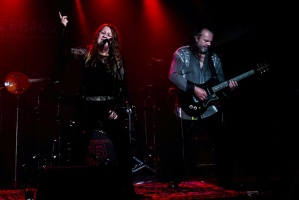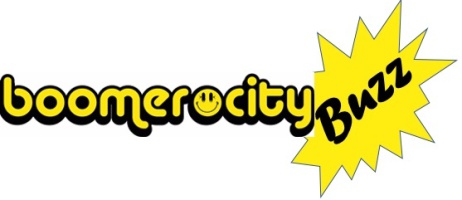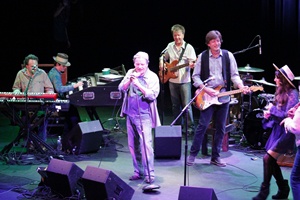Posted July 27, 2014
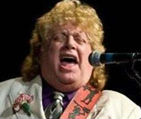 As I interview many great and notable people for Boomerocity, I am always amazed and the stories that they have to share – almost nonchalantly. The greatness that they’ve attained, been involved with or brushed up against boggles my mind.
As I interview many great and notable people for Boomerocity, I am always amazed and the stories that they have to share – almost nonchalantly. The greatness that they’ve attained, been involved with or brushed up against boggles my mind.
As I interview these people, I typically craft and groom the piece in a give and take narrative. Once in a great while, an interview happens where I pretty much turn on my recorder and listen to what an artist has to say with very little input from me. My recent interview with former Spirit bassist and current bottom man for Blowin’ Smoke Rhythm and Blues Band as well as for the new group, Sky Kings, is one such interview.
Fuzzy is a wealth of rock and roll history and knowledge with each and every one of his stories absolutely fascinating.
For this interview, I’d like to take the uncharacteristic approach of putting into writing the feel of being on the phone with Fuzzy as I was. With only a very few exceptions, this interview is almost all Fuzzy.
As our conversation began, I asked how things were and what all is going on his Fuzzy’s life.
“Everything is good. It’s all good. I’ve been busy on a bunch of music projects. I have a concert this Saturday with the eleven piece ‘Blowin’ Smoke Rhythm and Blues Band’ that I’ve had for eighteen years – going into our nineteenth year real soon. I also just released another project that I produced, played bass on and wrote half the songs. The band is called ‘Sky King’ and that’s doing very well with regards to our initial exposure and reviews we’ve been getting. They’ve been very, very positive and I’m appreciative of that.”
As if that’s not enough to keep a guy busy, he continued by saying, “I’m getting ready to edit and put out a live ‘Blowin’ Smoke’ album that was recorded very, very late last year out at Harvelle’s. And, then, I have plans of going in also this year and start a studio album with Blowin’ Smoke and we’re going to start laying tracks – again, this year – for new Sky Kings songs.
“So, the plate is full! Ha! Ha! I’ve got my ears open for other creative opportunities. I like to work and I love being in the studio . . . and I like to produce, as well. All of those things are on the table and, for Sky King, I’ve been talking to a friend of mine. He’s a film director and he’s working for a company in the film industry right now. We have never put a video out, yet, on any of the songs for Sky King. My overall project for Sky King was to create a video for every song because the CD itself happens to have a theme even though that’s not real popular in today’s CD music. Kids seem to like to download a song. But when we created the CD, it was a concept CD.”
“I have a long music history. It’s really been my entire life. I have seriously been into music since third grade in school. They 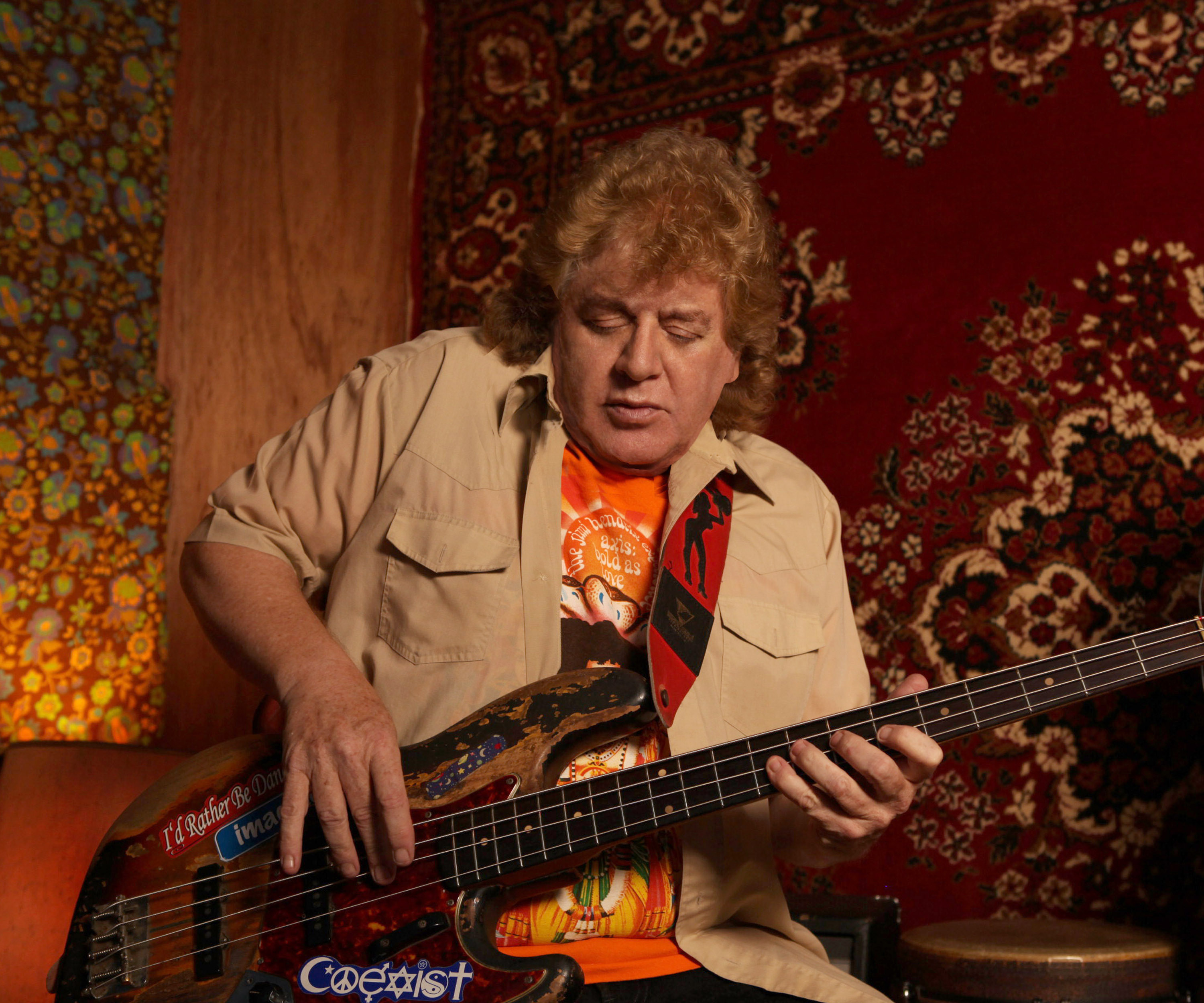
“So, they gave me a cardboard keyboard to take home. I would bring it back and forth to classes. You can’t hear anything on a cardboard keyboard. So the teacher asked my parents, ‘Would you buy this kid an instrument so that we can teach him some music?’
“In those years, we lived in a small apartment so a piano wouldn’t have even fit in the place that we lived in. So my mom and dad took me down to the local music store. I wound up playing violin. I played violin, believe it or not, all through what was left of grade school, junior high, high school and even into college.
“By learning orchestral music and reading music, and transposing and being a listener and developing my ear, it’s how I got into being a professional musician. I would say that I owe my start to the school system in St. Louis, where I’m from.”
On the heels of those comments, Fuzzy shared what and who his earliest musical influences were.
“When I was fourteen and fifteen years old, I listened at night time to a black radio station in St. Louis called KATZ/Sweet Sixteen. Every night that you would listen, they would broadcast live from some black night club in St. Louis. Nobody listened to this station except black people. I was probably the only white kid in St. Louis at that time that listened to it.
“Listen to this – these are the people they were broadcasting live every night: Albert King, Ike Turner, Chuck Berry, Little Milton and a couple of other guitar players that were popular in the St. Louis area that never became famous like these guys. By the time I was sixteen, I had already talked my mom into taking me to another music store – because I didn’t have enough money saved up – and she bought me a 1963 Fender Stratocaster guitar and a 1963 Fender Jazz bass, which is the same bass that I play to this very day. It’s been around the world umpteen times with me.
“So, being the kid that I was, I started sneaking into the black clubs with my friends so that I could see these people play. By the time I was seventeen years old, I was already playing with all of them. I would get gigs playing either guitar or bass. They were blown away. I was, like, the only white person in the night club except any friends that I brought with me and we always played in black clubs.
“In those years – I was born in 1944 – I’ll be seventy October 21st. The Blowin’ Smoke Band is nothing more than the music that inspired me when I was a teenager in St. Louis. By playing with all the black groups, I used to be invited and taken to Masonic halls and places where people like Ray Charles and Wilson Pickett and Otis Redding and James Brown – I could go on and on – they used to come into the city to play, they would play in black venues only. The bands that they brought with them always had horn sections and there were back-up singers and dancers, an emcee and a lot of people would also perform before the star hit the stage.
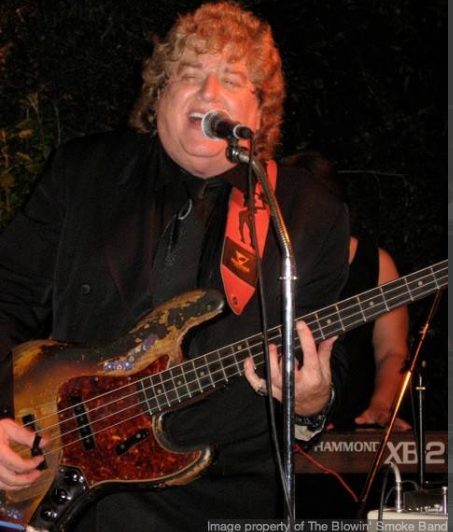 “The Blowin’ Smoke Rhythm and Blues Review is a similar style show. I have four horn players in that band. I have three black female lead singers. I sing lead. My guitar player sings lead, also. There’s a four piece rhythm section to the band. We are an eleven piece band. I gotta tell you, Randy, it’s not easy – especially in today’s music market – for an eleven piece band to survive. But the fact of the matter is, we’ve been together almost nineteen years now and we play all the time. I’m very proud of the format because I know that there are a lot of young kids that really have never seen anything like what we do. I get a chance to talk to them when we perform – after we’re done – and they always come up to me and they’re, like, flabbergasted. They go, ‘Damn! I’ve never seen anything like this before!’
“The Blowin’ Smoke Rhythm and Blues Review is a similar style show. I have four horn players in that band. I have three black female lead singers. I sing lead. My guitar player sings lead, also. There’s a four piece rhythm section to the band. We are an eleven piece band. I gotta tell you, Randy, it’s not easy – especially in today’s music market – for an eleven piece band to survive. But the fact of the matter is, we’ve been together almost nineteen years now and we play all the time. I’m very proud of the format because I know that there are a lot of young kids that really have never seen anything like what we do. I get a chance to talk to them when we perform – after we’re done – and they always come up to me and they’re, like, flabbergasted. They go, ‘Damn! I’ve never seen anything like this before!’
“As the icons pass away – we lose James Brown and we lose Ray Charles and that style – there are a few people that are kinda getting into it. I like Sharon Jones and the Gap Band. They’re actually doing old R&B and blues and doing it well and selling records. That’s the way of the music world. Everything comes around sooner or later.
“Anyway, that’s how I started. I started playing the blues and R&B in St. Louis. I had my own groups there. My very first group, believe it or not, was called, ‘The Galaxies’. Then I had another group called, ‘Larry Knight and the Upsetters’. When I had that band, I recorded a record – in those days there were no vinyl albums. There were only 45’s that were being put out. I was signed to Golden World Records up in Detroit which is now a subsidiary of Motown. A producer came down to St. Louis and into a studio and I recorded a record called ‘Hurt Me’ that I wrote. The flip side I also wrote called ‘Everything’s Gone Wrong’. It actually became a hit record in St. Louis, Chicago, and Detroit. I had a regional breakout. It was late 1965. It was up on WLS in Chicago and KXLK Radio in St. Louis. It got into the top ten and things were going really fantastic. I thought, ‘Wow! This is it! I might make it!’
“At that time, another record came out of St. Louis that was very popular, which was a band called Bob Kuban and the Inmen and the name of the song was called ‘The Cheater’ and it actually got up on the big charts. He came out to California and was on the Dick Clark Show and the shows that were like that at that time. I was right behind them and I got this fateful letter in the mail that ‘You are drafted and you will be going to Vietnam’.
“I did and I served fourteen months in the Vietnam War, unfortunately. I lost two years of my life and two years of almost the most influential period in music. I was away from 1966 through 1968 and that’s when the Beatles were really ripping it up. Music was changing into rock and roll and English rock. And it’s funny. It was all rooted in the blues and the old blues guys!
“So, when I got out of the service, I immediately went on the road with a band – within two weeks. I tried to get my head straight and tried to catch up on what was happening and what was going on in the business. I put another band together called ‘Pax’. That’s the Latin word for peace. I had a three piece blues/psychedelic/rock band with a gal by the name of Gracie Dumas – a singer who used to sing with Ike Turner – as my lead vocalist.
“We were doing a lot of gigs around the Missouri and Illinois are at the time. Barry Goldberg from the Electric Flag came into St. Louis and one of the black DJ’s took him out to a gig to see us perform. Barry was blown away and took us into a studio in Chicago. To this very day, I’ve got those five recordings. We did five songs that he produced. He gave me his address and phone number in California. He lived in Topanga Canyon out here. He said, ‘You bring me your band to California. I’ll guarantee you a record deal, I’ll be the producer and we’ll see what happens.’
“So, four months later I poured everybody into a van and we drove across the country and I got all the way out here and went to Barry’s address in Topanga Canyon to see him. Unfortunately, when I got to his house and knocked on his door, somebody else answered and said, ‘Barry’s not going to be back for at least six months’. I asked, ‘Well, is he on tour?’ and the guy said, ‘No. He’s in rehab for heroin addiction.’ He and Buddy Miles – there was a whole bunch of guys in Electric Flag that were pretty wasted back in those days.
“There I was in California. I had no one. I had not one contact other than him and I didn’t know what to do, where to go, 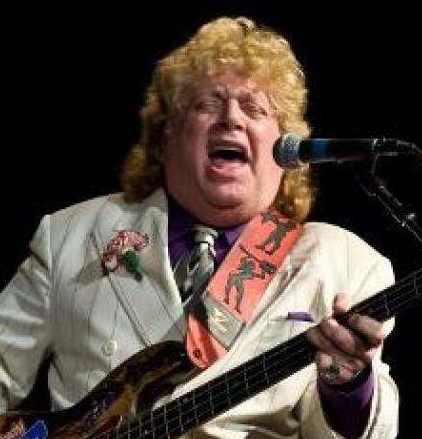 where to play, how to make a penny. Believe it or not, it launched me on the second part of my professional career which became phenomenal.
where to play, how to make a penny. Believe it or not, it launched me on the second part of my professional career which became phenomenal.
“The band that I brought to California, of course, we were playing gigs and we had a booking agency and we were surviving. But this is very interesting: One day, as I was driving in the valley – San Fernando Valley here in L.A. – I saw a marquee and it said, ‘Delaney, Bonnie and Friends’.
“I grew up in St. Louis with Bonnie Bramlett. What was even more interesting is that they had just come back from their UK tour. That was when Eric Clapton was playing with them, and George Harrison, Leon Russell – they had the greatest band in the world. Eric Clapton took the Delaney and Bonnie rhythm section – he took the band away from them, basically – and he started Derek and the Dominos.
“So, when they came back to L.A., they had picked up some local musicians and were playing this club that was only a few blocks from their home where they lived. I thought, ‘I grew up with Bonnie! I gotta go see her!’
“I went into the club before they started playing and I wrote a note on a napkin and I asked the waitress to take it backstage. She did and Bonnie came screaming out from the back room, jumped on my table, knocked the drinks over and we hugged. She said, ‘You better get up on the stage and sit in with this band!’ I did. I had my guitar with me that night and I played the blues.
“When the night was over, Delaney asked me if I would like to go out on tour. He said that they were leaving in ten days and he gave me two reel-to-reel tapes and said, ‘This is our show. Learn it.’ I never even got to rehearse with the whole band. I just went over to his house a couple of times. I was with Delaney and Bonnie as their lead guitar player until the band broke up. They divorced and that was the end of Delaney and Bonnie.”
Later in our conversation, Fuzzy had more to say about Bonnie Bramlett.
“Bonnie and I are two months apart in age – actually, one month apart. Her birthday is less than thirty days after mine. She has always – from the very, very beginning back in our high school days – always has been a phenomenal singer. Before Tina Turner was popular, we played in an area in St. Louis called Gaslight Square where they had places like how the Peppermint lounge was big in New York City? They had the Butterscotch Lounge and all of these various night clubs on this one strip of about two blocks. It had all of the old gas lamps that were in St. Louis back in the old cobblestone/gas lamp time. I played in every club on that street and so did Bonnie. There were times when we played with each other and with different people. We were always friends and new each other well.”
Picking back up on Fuzzy’s early days on the California music scene, he said, “During that period – even before that – I was very lucky out here in L.A. At that time, you could walk into a record label like Capitol Records or A&M and you could put your name up on a board there and say, ‘I do session work’. I was very lucky in that I met a drummer whose sister was the secretary of the president of Capitol Records. So we got hooked up with a lot of artists who were recording for Capitol and we became studio musicians. I did a lot of demos for them and albums for them. I played with guys like Jim Rose, Chi Coltrane – the list goes on and on. I was buzzing about L.A., playing recording sessions and doing gigs with everybody. Then I was with Delaney and Bonnie.
“I met Randy California and Ed Cassidy from Spirit in those days. The music community in back in the late sixties/early seventies was a beautiful thing. People from all different kinds of bands could get together and play and jam; get kinda stoned, high, trip out and all that kind of stuff. But it was really a great time! It was through us playing together with Randy California and Ed Cassidy, the same thing happened. After we played a couple of times, Randy said, ‘I want you to join my band. We’ve got some gigs that we’re gonna do as Spirit but I’m also working on my first solo album called ‘Kapt. Kopter’. I got to record tracks with him on that. We went to Europe as Spirit. I stayed with him from 1970 when we first met all the way through 1980-81 – about ten or eleven years. I guess I have about eight or nine different album releases under the name, ‘Spirit’, with Randy California and Ed Cassidy. We toured Europe and lived in London for about a year and a half. Went to every country, every city in every country in Europe.
“Miles Copeland actually produced an album for us, ‘Live at the Rainbow Theater’, during that period. The Police were opening shows for us for six months. They hadn’t even recorded ‘Roxanne’ yet. They were doing punk rock and people were booing them off the stage. As soon as they got into that reggae feel and incorporated it into their songs, they took off. It wasn’t long before we had to open shows for them! That’s the way it works in the business. It was great and I even got a chance to work for Jefferson Airplane’s organization.
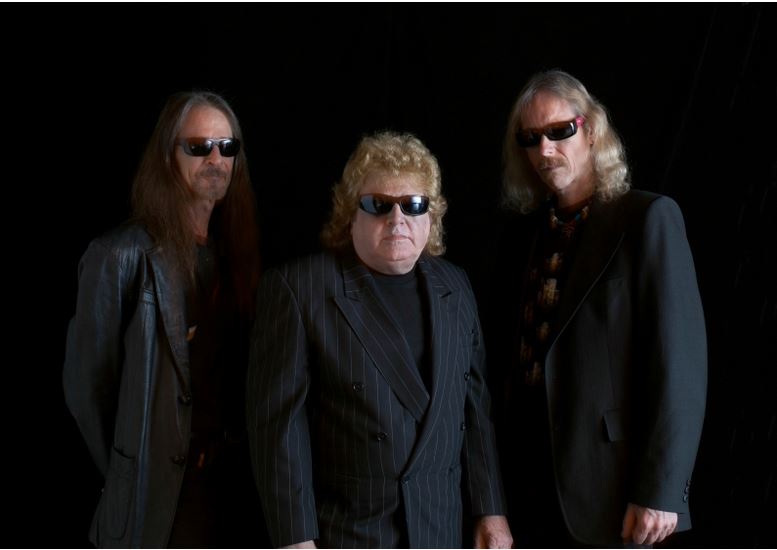
“So, I had a call while I was down here in L.A. and they invited to come up to San Francisco. They just wanted to hear me play. They sent me a ticket and I flew up there. They offered me – I remember this because, to me, this was the most money in the world – they gave me a twenty-five thousand dollar advance to move up to San Francisco and record for Peter Kaukonen. I did his ‘Black Kangaroo’ album.
“I did a whole bunch of artists that they had signed. I even did one with Marty Balin – one of his first solo albums. Jack Bonus and some other people. I was like a studio bass player and we were opening shows with Peter’s band for Hot Tuna which his brother, Jorma Kaukonen, was the guitar player in. It was pretty wild and things were going great. I loved it up there. I had a house in Mill Valley in the Redwood Forest. Everything was a dream, almost.
“And then Randy (California) called me from L.A. and said, ‘You gotta come back. We’re gonna go to Europe again. There’s TV shows we’re gonna do and a whole bunch of stuff’ and I said, ‘I’ll be right back. I’ll see you as soon as I give them my notice and pack up my stuff’. I moved back to L.A. and rejoined Spirit again. That went on all the way through until 1980/1981. Then I got involved in many more projects from that point on.
“Eventually, I got to the point where I was missing my roots. I wanted my roots back. I plaid rock and blues. I’d done a little bit of everything, so far. I felt that it was time to do this R&B review band. So, eighteen or nineteen years ago, I started Blowin’ Smoke. It did phenomenal. We played all the big blues festivals out here. We did the Monterey Blues Festival a couple of years in a row. The San Diego Blues Festival. The Doheny and the Long Beach – all the great blues shows and we’re still together. It’s almost a miracle to be able to hold an eleven piece group together. If you can make it two years your lucky, let alone nineteen. I feel sort of like John Mayall. He had some great guitar players and great singers over the course of the years but the legacy just goes on – to continue. I’m gonna keep it going for as long as I can.
“Sky King is different – all original music, only. It has influences of R&B, blues, folk, jazz and rock and roll all mixed together. It’s none of any of those. It’s just a hybrid. I call it alternative rock/R&B/blues. Ha! Ha! Whatever that means! All I know is that it confuses everybody. They don’t what category to put it into. But the music and the performances of all the players is phenomenal – a work of art! I’m very proud of the CD and very proud to be the producer of the music. I worked on it a long time and I feel real good about it.”
Everybody has seen the news about the lawsuit that Randy California’s estate has filed that alleges that Jimmy Page and Robert Plant used Spirit’s “Taurus” as the foundation in writing “Stairway to Heaven”. I asked Fuzzy if he had any thoughts or insight into the matter.
“This is also very interesting because in 1971 I was playing with Randy. That’s when we were recording the tracks for the Kapt. Kopter album – his first solo album. I remember when he first heard a Led Zeppelin album when it first came out – the Stairway to Heaven album – I think it was in ’71. I remember him saying to me – he said, ‘Did you hear this album by Led Zeppelin?’ I said, ‘Not yet’, and he said, ‘Oh, when you do, listen to this track. It sounds like a sound I’ve already written. Not the whole song but the introduction to it sounds exactly like the song, ‘Taurus’.’
“He used to do that every once in a while on tour. He would bring out his acoustic guitar. Sometimes it would segue into ‘Nature’s Way’ or whatever. He never, at that time, accused them of stealing it. He just said that it sounded really similar to his song. But, if you think about the music business itself and how artists influence other artists – especially old blues people – a lot of rock and roll players have used blues formats or blues licks to write songs. If you do a descending scale – a lot of people have used descending scales. When I listen to the Black Keys’ new CD, the very first song reminded me of Pink Floyd. I was thinking more of the Pink Floyd than I was the Black Keys.
“To be honest, I don’t know if there’s any validity in a law suit like that. I think that if Randy really believed that he had been ripped off – the people that I know who knew his financial status have said that he never had enough money to sue them. I don’t know if that’s true or not but he never went after them. I think he would have been happy if they had actually it and had used it, if they had used it and said, ‘Well, we were influenced by Randy California of Spirit.
“Now, according to Mark Andes – the original bass player – in 1968 while I was still in Vietnam, he said that Led Zeppelin came to the United States and had opened shows for Spirit and that they had heard their music and liked the music of Spirit and they probably heard Taurus. Maybe it was in the back of their mind from what they heard. Maybe they heard it on stage and liked what they were doing and just decided, ‘Oh, we can do something similar’, you know? I don’t know if they’re willing to say, ‘Yeah, Randy influenced us so we’ll give him a little credit.’
“As far as the money and all of that is concerned, I don’t know. But, if it was me, I probably would not sue them. What I would do is I would have a legal person contact them and ask them was Randy California an influence for this song – just to see what they would say. To see if they were honest thirty or forty years later.
“From what I was told, there’s a statute of limitations – they would only be qualified to receive three years’ worth of current royalty. The only reason that all of this shit came up to begin with is because Jimmy Page has been re-mastering or re-digitizing all of the original recordings and they’re all going to be coming out again in a new updated sound format. If he decided not to do that then none of this would have come up.
“It’s been said over the years a bunch of times – I’ve heard this story many times – and the fact of the matter is if that’s what his family wants to do – that’s what his sister wants to do – more power to her. I don’t want to enjoin any suits. I wasn’t the writer of the song. There’s only one guy in the band that matters. It’s not Spirit, it’s Randy California. He was the writer. He actually wrote the song, Taurus, for his step-dad, Ed, whose birthday – he was a Taurus. That’s why the song came to be to begin with.”
As we discussed the overlap of musical influences by way of style and structure, Fuzzy said, “Well listen to this: Okay, Randy – at the age of fifteen and a half – played with Jimmy James and the Blue Flames in Café Wha? in New York City. Now, over the years the style that Randy played live in concert, you would almost think that you were listening to Jimi Hendrix.
“This is a very interesting story. I’m going to tell you something that I think may blow your mind. Ed Pearl in L.A. – way back in mid-sixties/late sixties – had a night club called The Ash Grove. It was very popular out here. It was like The Troubadour but even more popular at the time. He would bring in all these old delta blues men. I mean the original delta blues men. He would feature them at the Ash Grove. These people, when he brought them in, did not live in hotels when they were brought out here. They stayed at Ed Pearl’s home. Randy, at that time he was already playing guitar, would go and hang out at his uncle’s house while these blues men lived there while they were doing these shows in L.A. Almost every single one of them would sit down with Randy and show him their acoustic blues style of playing. He incorporated all of that into his style.
“When Jimi met Randy, it was by accident in what I think was Manny’s Music in New York, and Randy was sitting in the music store playing his acoustic guitar and Jimi heard him and was astounded by this young white kid playing this authentic style acoustic blues. That was how he got invited to join Jimi’s band in the village at that time.
“Jimi Hendrix could probably – if he were alive today – say, ‘Well, Randy’s playing in his songs, they sound a whole lot like my stuff.’ That’s what artists do. You should be more flattered. There’s a rip-off somewhere. Like, when George Harrison did ‘My Sweet Lord’. Remember that law suit that developed? That was chord for chord of a whole song! It wasn’t just like a twelve bar intro or an eight bar intro. There was a big difference. You take the entire chord progression of the song and write different words over it, I would say, yeah, you’re sort of treading on dangerous ground when you do something like that.
“By the way, you know, it was Jimi Hendrix who gave Randy his name, ‘California’. When he was in Jimmy James and the Blue Flames, there were two Randy’s in the band. One was from Texas and the other one was from California. You can guess which one was which. To distinguish between the two, he decided that Randy Wolfe would be Randy California so that the right guy would answer when he had something to say.
“But as far as Randy is concerned – and Led Zeppelin – I think that it would just be a matter of if they want to be gracious and either say, ‘We didn’t do’ or ‘Yeah, we were influenced by what we heard’. Who knows?
“Like I said, I know Randy for years and years and years and he’d heard, ‘Why don’t you sue them?’ and he never did. I would think that if it was that important to him – and believe me, he could’ve used the money, I know that because he used to spend every dime he ever made to go back into the studio and record. That’s all he liked to do was write songs and record in the studio. But he never did (sue) so I guess, maybe, it didn’t matter that much to him. If it did, he would’ve done it.
My last question for Fuzzy is one that I usually ask veterans of the music industry: When you’ve stepped off the tour bus for the final time and you go to that great gig in the sky, how do you want to be remembered and what do you wish your legacy to be?
“The main thing is that it’s the music that counts, the messages in the songs that you write and that you record, those things do positive and happy and healing things to humanity. It’s not for one person; it’s for every single human being. It’s the same when you go and play a gig. I do not care if you play in front of a half a million people if you’re playing for twenty people in a night club. The whole idea of being there and doing what you’re doing is that when you’re done at the end of the night, you know that you’ve given a hundred and ten percent of what’s inside of your soul – your spirit – up there on that stage; that you’ve played the best that you can play and that you hope that, when the people that experienced that moment with you, that they go home feeling better than when they got there to begin with. That’s all there is to it.
There’s nothing else that I can add. I want it to be positive. I want it to be happy and, hopefully, if they’re having a bad time, maybe even healing. I would say that’s what I want people to remember.”



